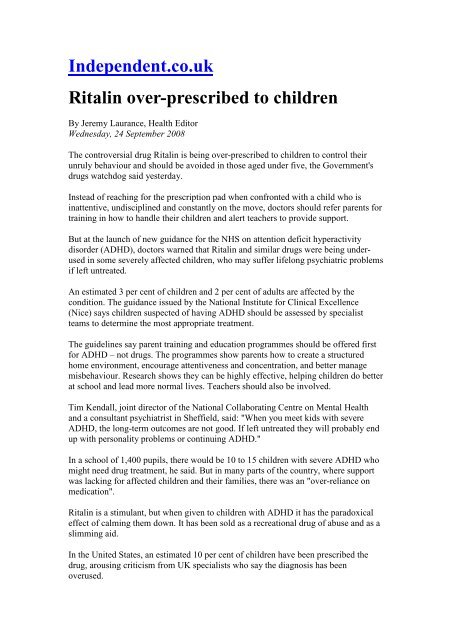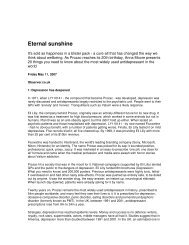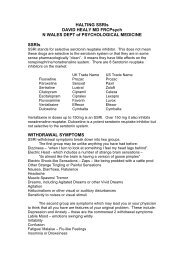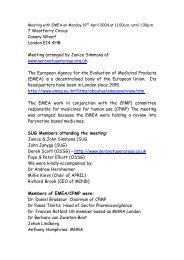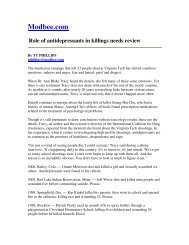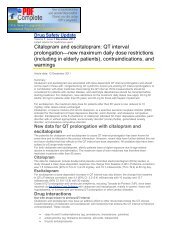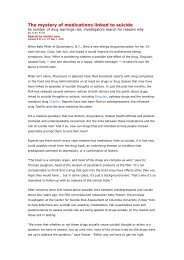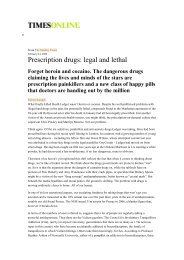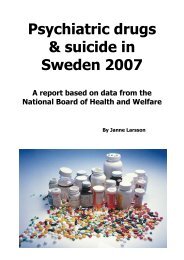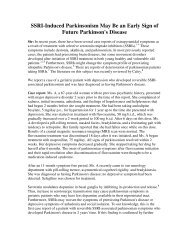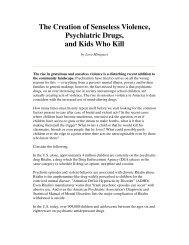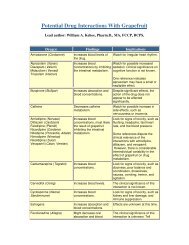Ritalin Over Prescribed to Children - Seroxat User Group
Ritalin Over Prescribed to Children - Seroxat User Group
Ritalin Over Prescribed to Children - Seroxat User Group
You also want an ePaper? Increase the reach of your titles
YUMPU automatically turns print PDFs into web optimized ePapers that Google loves.
Independent.co.uk<br />
<strong>Ritalin</strong> over-prescribed <strong>to</strong> children<br />
By Jeremy Laurance, Health Edi<strong>to</strong>r<br />
Wednesday, 24 September 2008<br />
The controversial drug <strong>Ritalin</strong> is being over-prescribed <strong>to</strong> children <strong>to</strong> control their<br />
unruly behaviour and should be avoided in those aged under five, the Government's<br />
drugs watchdog said yesterday.<br />
Instead of reaching for the prescription pad when confronted with a child who is<br />
inattentive, undisciplined and constantly on the move, doc<strong>to</strong>rs should refer parents for<br />
training in how <strong>to</strong> handle their children and alert teachers <strong>to</strong> provide support.<br />
But at the launch of new guidance for the NHS on attention deficit hyperactivity<br />
disorder (ADHD), doc<strong>to</strong>rs warned that <strong>Ritalin</strong> and similar drugs were being underused<br />
in some severely affected children, who may suffer lifelong psychiatric problems<br />
if left untreated.<br />
An estimated 3 per cent of children and 2 per cent of adults are affected by the<br />
condition. The guidance issued by the National Institute for Clinical Excellence<br />
(Nice) says children suspected of having ADHD should be assessed by specialist<br />
teams <strong>to</strong> determine the most appropriate treatment.<br />
The guidelines say parent training and education programmes should be offered first<br />
for ADHD – not drugs. The programmes show parents how <strong>to</strong> create a structured<br />
home environment, encourage attentiveness and concentration, and better manage<br />
misbehaviour. Research shows they can be highly effective, helping children do better<br />
at school and lead more normal lives. Teachers should also be involved.<br />
Tim Kendall, joint direc<strong>to</strong>r of the National Collaborating Centre on Mental Health<br />
and a consultant psychiatrist in Sheffield, said: "When you meet kids with severe<br />
ADHD, the long-term outcomes are not good. If left untreated they will probably end<br />
up with personality problems or continuing ADHD."<br />
In a school of 1,400 pupils, there would be 10 <strong>to</strong> 15 children with severe ADHD who<br />
might need drug treatment, he said. But in many parts of the country, where support<br />
was lacking for affected children and their families, there was an "over-reliance on<br />
medication".<br />
<strong>Ritalin</strong> is a stimulant, but when given <strong>to</strong> children with ADHD it has the paradoxical<br />
effect of calming them down. It has been sold as a recreational drug of abuse and as a<br />
slimming aid.<br />
In the United States, an estimated 10 per cent of children have been prescribed the<br />
drug, arousing criticism from UK specialists who say the diagnosis has been<br />
overused.
Dr Kendall said that in genuine cases of ADHD, the symp<strong>to</strong>ms of inattentiveness,<br />
lack of concentration and being constantly on the move resulted in impairment of<br />
school work and relations with friends or family. Where drugs were prescribed, they<br />
should be given in small doses and the effects moni<strong>to</strong>red.<br />
Nicola Salt, a GP in south London and member of the Nice guideline committee, said<br />
ADHD in a child could affect the whole family. When a parent said their child was<br />
hyperactive, the first question <strong>to</strong> ask was, what were they like at school? "If the child<br />
is OK at school, it is unlikely <strong>to</strong> be ADHD," she said.<br />
The facts about attention deficit hyperactivity disorder<br />
A child with ADHD is driven by a mo<strong>to</strong>r that cannot be switched off. Those affected<br />
are always on the move, running, climbing or jumping, and talking all the time. They<br />
find it almost impossible <strong>to</strong> concentrate, tend <strong>to</strong> push in<strong>to</strong> queues, blurt out answers <strong>to</strong><br />
incomplete questions, butt in<strong>to</strong> conversations, and act without thinking, making them<br />
accident prone.<br />
At school they are easily distracted, forgetful, unfocused, and disorganised. They may<br />
also find it hard <strong>to</strong> keep friends and suffer from bullying. The feature that<br />
distinguishes ADHD from normal childhood impulsiveness is that it is pervasive in all<br />
areas of life.<br />
The causes of ADHD are thought <strong>to</strong> include both genetic and environmental<br />
influences. Diet has been implicated. Problems in the womb or birth trauma could<br />
also cause damage in the brain, leading <strong>to</strong> the condition.<br />
j.laurance@independent.co.uk<br />
©independent.co.uk


